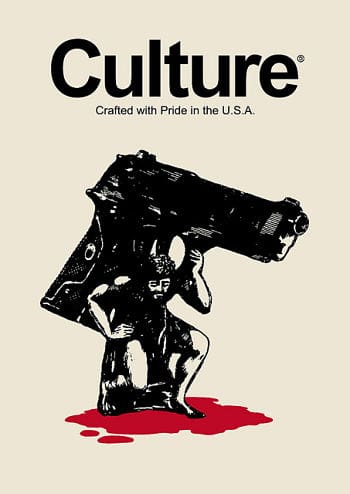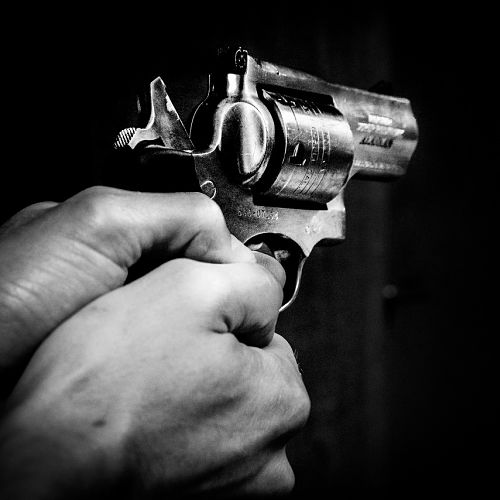What is it like to be a ‘good guy with a gun’ – or is that even a contradiction in terms? Today we continue to revisit Allegra’s highlights for 2016 via Bradley Dunseith’s post discussing ‘self-defence insurance in the South US’.
Ever since Trump’s unexpected victory we have seen a surge of interest toward studies on ‘angry white men’ in our collective attempt to understand this disturbing chapter of history. Dunseith’s fieldnotes contribute to our common understanding in the most welcome anthropological fashion: he aspires to hear – and possibly also understand – the motivations of people supporting the right, and need, to carry firearms.
As difficult as it may feel, such understanding is becoming increasingly crucial in preventing the growing polarisation of the world. This applies particularly to populations whose political views and beliefs differ most sharply from those held by most scholars of the liberal left – however one defines that. Which is not to say that we could not – or should not – remain critical of distinct behavior at the same time.
<<<
Greg is slightly balding and wears an untucked though formal plaid shirt as he tells a group of thirty gun owners seated at the back of a diner in metro-Atlanta what they can learn from “the Zimmerman example.” George Zimmerman, Greg reminds his audience, used his gun – to kill the 17-year-old Trayvon Martin – in self-defence and was legally acquitted. And yet, the presenter stresses, not only is Zimmerman now villianized across the country, he also had to pay astronomical legal expenses despite being found not guilty.
Greg (all names have been changed) then brags that his company has Zimmerman’s lawyer on their payroll. Unfortunately, he concedes, Zimmerman was not covered by the insurance company and, thus, had to pay his legal fees out of pocket.[1]
Greg is a representative from U.S. Law Shield, a part of a burgeoning industry colloquially known as “self-defence insurance.” For $10.95 USD a month, U.S. Law Shield will cover nearly all legal fees their clients incur after using a legal weapon in self-defence in both criminal and civil courts. The insurance company also runs a 24/7 attorney answered emergency hotline exclusive for their members.
As far as I can tell, I am the only unarmed member of the audience. Most of the attendees are openly carrying a handgun holstered to their side. That Greg wears his shirt untucked is a good sign that he may be concealing carrying a gun too. How do I know this? I am a month into my fieldwork with gun owners in Georgia, trying to understand what it means, “to be a good guy with a gun.” While some gun owners prefer to “open carry” for reasons of comfort, as a political stance, or because they believe it deters crime, others opt for “conceal carry”, keeping their firearm hidden from view to avoid public scrutiny or to gain the upper hand in a hypothetical confrontation with a would-be-attacker.
A loose fitting, untucked shirt on a man in the middle of a pro-gun organization, I have learned, is often not a fashion choice but a deliberate way to obscure the slight bulge of a concealed handgun. Most of the gun owners I have met and spent time with have told me that when they do open carry, they also conceal carry at least one firearm. Just in case.
Following the everyday lives of gun owners – in daily decisions of how to arm themselves, for instance – I thought would help understand why owning a gun is so important and how a relatively small number of gun owning Americans are so successful in stopping even the slightest measure of gun control.
In an infamous speech given just a week after the Sandy Hook School Shooting, Wayne LaPierre, the Vice President of the National Rifle Association, declared that “the only thing that stops a bad guy with a gun is a good guy with a gun.”
If what America needs is not less guns, but more “good guys” with guns, then what does it actually take to be a “good guy with a gun”? Who are these good guys and how do they imagine their allegedly evil counterparts?
These questions led me to U.S. Law Shield’s seminar, hosted by a local gun rights organization. The organization had deemed U.S. Law Shield to be the most comprehensive self-defence insurance provider for Georgian gun owners.
“Good guy shirt”
The meeting is being held inside an unpretentious diner. The manager is a member of the local gun rights organization and reserved part of the diner’s space for U.S. Law Shield’s seminar. We are seated near the back of the restaurant, behind two pool tables and in front of the bathrooms. Periodically, a general patron cuts through the booths of gun owners to the washroom, sometimes a passer-by realizes that they’re surrounded by armed men and women but many do not notice the diverse array of handguns.
“Proof,” a gun owner I’m sitting beside tells me. “A room full of guns and no one’s gotten shot.”
Greg finishes his introductory remarks and introduces the main speaker for the night: Grant, a full-time cop and part-time employee at U.S. Law Shield who is to explain to the almost exclusively white audience how to avoid getting killed by the police for having a gun.

Grant begins his presentation by emphasizing his belief in the Second Amendment. He tells the audience that so long as you are not “stupid enough” to get convicted of a felony then it is your “God given right to own and carry a gun.”
The comment brings cheers and applause to the room.
Grant explains that he gives seminars to other cops about gun laws in the state of Georgia. He warns the audience that police officers are notoriously unaware of changing gun laws but adds that telling a cop that you know the law better than him is not going to help your case.
“You want to be able to walk away from a situation like this with your body and your rights intact,” Grant tells his audience solemnly. Since gun owners do not wear “good guy” and “bad guy” T-shirts, Grant continues, gun owners must demonstrate their good intentions through body language.
In the scenario of getting pulled over, for instance, Grant suggests gun owners should turn off their cars to indicate that they have no intention of fleeing the scene.
At this point someone in the audience suggests gun owners could even take the keys out of their cars and place them on the dashboard. Grant sighs and concedes that while “it’s not a bad strategy” it reminds him of how he’ll pull someone over and “they’ll do the whole ‘hands up don’t shoot thing’” – referring to the protests over the killing of Michael Brown by a police officer in Ferguson, Missouri in 2014.
The audience laughs.
Someone in the crowd then mentions Sandra Bland, an African-American woman who had, just a few days earlier, been found dead in police custody after being forcibly removed from her vehicle in Texas. Grant ignores the remark but the audience holds on. “I heard she was real mouthy,” a middle-aged woman yells out.
Sandra Bland’s tragic death, it seems, is not one the group of overwhelmingly white men and women have to worry about. Left unsaid at U.S. Law Shield’s sale pitch is that looking like a “good guy” to a cop has more to do than just putting on a T-shirt.
The memories of African-Americans killed in recent years are conjured up by both presenters and audience members alike only to be ridiculed or dismissed as somehow deserving of their deaths.
In Greg’s detailed description of how to look like a “good guy” in front of law enforcement, nowhere is there acknowledgement of racial profiling in police practices or tips on how to anticipate such profiling. Greg’s advice on how to wear a “good guy shirt” is intended for a white audience.
Who’s protecting you?

As the discussion subsides, Grant moves the focus of his presentation from dealing with police in public to dealing with police inside the home, after a self-defence situation has already occurred.
“When someone breaks into your home, your plans go out the window,” he tells the crowd. He tells the audience that next time they set an alarm at 3:00 am to do a home defense exercise (many gun owners carry out defence exercises in the same way parents plan home fire drills), they should first “take a dump” in their pants for a more authentic rehearsal.
The audience laughs and Grant pauses a moment for dramatic effect. “You’ll have crapped yourself because you weren’t woken up by an alarm but by your daughter screaming in her room. Then you’ll hear shots fired.”
Silence from the crowd.
“It’s no longer funny, is it?” Grant asks the silent audience. “I’m sorry, but that’s something you have to face.” He pauses again. “And then the police show up. You’re at your most primal state and the police arrive. Do you have your ‘good guy’ shirt on? No.”
When the police arrive, Grant continues, they will not immediately know who the homeowner is. “Who’s the good guy? The guy bleeding or the guy holding the gun?”
In such situations Grant strongly suggests gun owners comply with the police, no matter how difficult or confusing. “Does anyone want to be political?” He asks, growing impassioned. “Does anyone want to end up fodder for a district attorney?”
To contextualize, Grant adds that a police officer will take 72 hours after shooting someone before making a public statement in order to gather themselves but the detectives will insist on a statement from the hypothetical gun owner in question immediately.
“And in the current climate your act of self-defence is going to come right in the middle of the media and national politics. Who’s protecting you? And if you don’t have someone then you’re up the creek. And it doesn’t smell good.”
The question Grant’s presentation poses is not how to avoid more shootings in the U.S. but rather how to avoid becoming the next George Zimmerman. And for that, according to Grant, gun owners are going to need a legal team behind them.
Preparedness as a politics
Every gun owner I met while doing fieldwork acknowledges the unlikeliness of ever having to use a gun in self-defence. In fact, gun owners I met are adamant that they hope to never have to use a gun to defend themselves and end someone else’s life in the process. That being said, the concern that it may happen is strong enough to power insurance companies.
Gun owners are vocal about not wanting to be put in a situation where they are forced to use their gun. However, the situations in which gun owners I spent time with are prepared to use deadly force include incidents like a mugging or a physical assault.
While such actions are not justifiable are they worth ending someone else’s life? Does drawing a gun not risk, in certain situations, escalating a situation or amount to a disproportionate use of force? In many States the law would say no, and with a comprehensive insurance policy for a nominal monthly fee, legally taking another person’s life becomes even easier.
The levels of preparation for unlikely, hypothetical threats that gun owners practice in their everyday lives (demonstrated through deliberating on how best to carry firearms and whether to buy self-defence insurance) helps shape political and ethical frameworks for understanding what it means to be safe and how much another person’s life is worth. These frameworks translate into dedicated political activism.
Gun rights activism is a relatively recent phenomenon in the United States. It was only after 1977 that the NRA became as politically active as they are now. Similarly, the gun rights organization that hosted U.S. Law Shield is just a little more than a decade old. These organizations are remarkably successful in expanding and deepening the rights of gun owners in part by advancing a moral politics of good and evil which simplifies the complexity of human lives, making Others seem even more incomprehensible and therefore more dangerous.
As I get up to leave the now empting diner at the conclusion of Grant’s presentation I ask Johnny, a gun owner I am sitting beside, what he thinks of the presentation and whether he will buy U.S. Law Shield’s insurance. Johnny tells me that none of the information presented is new to him but he will still probably purchase the insurance. He opens his wallet and shows me a card bearing the logo of another self-defence insurance provider, casually remarking that it is safer to have both companies behind him, in case anything happens.
[1] Zimmerman’s lawyer, Mark O’Mara, originally volunteered to represent Zimmerman pro bono but later sought compensation after discovering that Zimmerman had set up an online crowd funding page that generated over $200,000 USD.





